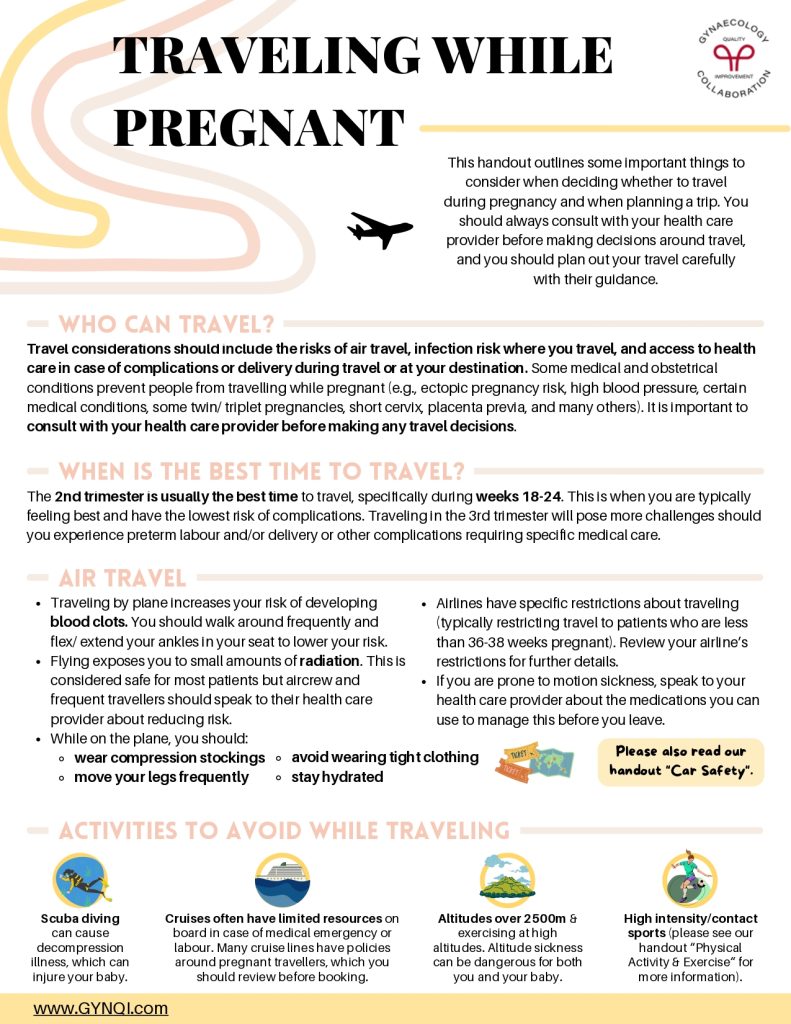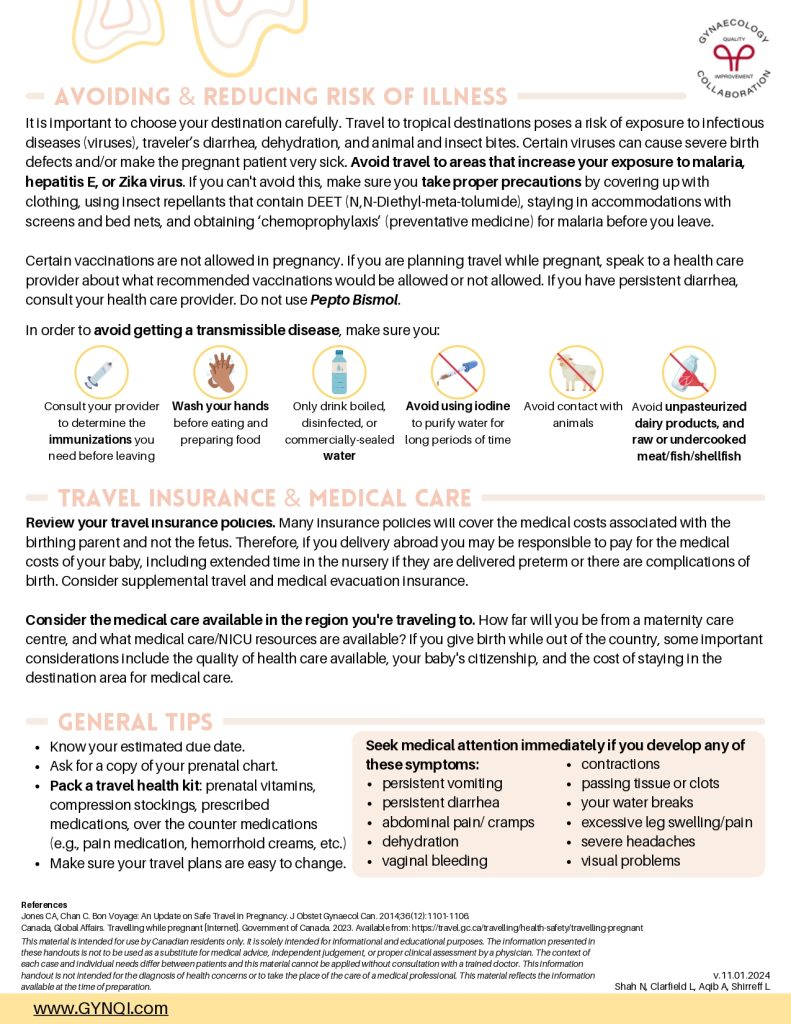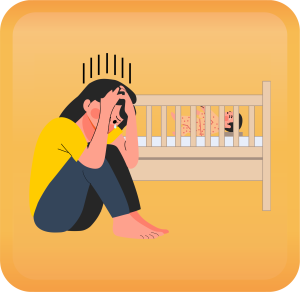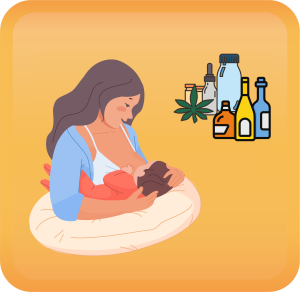Travelling While Pregnant
This handout outlines some important things to consider when deciding whether to travel during pregnancy and when planning a trip. You should always consult with your health care provider before making decisions around travel, and you should plan out your travel carefully with their guidance.
Who Can Travel?
Travel considerations should include the risks of air travel, infection risk where you travel, and access to health care in case of complications or delivery during travel or at your destination. Some medical and obstetrical conditions prevent people from travelling while pregnant (e.g., ectopic pregnancy risk, high blood pressure, certain medical conditions, some twin/ triplet pregnancies, short cervix, placenta previa, and many others). It is important to consult with your health care provider before making any travel decisions.
When Is the Best Time to Travel?
The 2nd trimester is usually the best time to travel, specifically during weeks 18-24. This is when you are typically feeling best and have the lowest risk of complications. Traveling in the 3rd trimester will pose more challenges should you experience preterm labour and/or delivery or other complications requiring specific medical care.
Air Travel
-
- Traveling by plane increases your risk of developing blood clots. You should walk around frequently and flex/ extend your ankles in your seat to lower your risk.
- Flying exposes you to small amounts of radiation. This is considered safe for most patients but aircrew and frequent travellers should speak to their health care provider about reducing risk.
- While on the plane, you should:
- wear compression stockings
- move your legs frequently
- avoid wearing tight clothing
- stay hydrated
- Airlines have specific restrictions about traveling (typically restricting travel to patients who are less than 36-38 weeks pregnant). Review your airline’s restrictions for further details.
- If you are prone to motion sickness, speak to your health care provider about the medications you can use to manage this before you leave.
Please also read our handout “Care Safety”.
Activities to Avoid While Travelling
- Scuba diving can cause decompression illness, which can injure your baby.
- Cruises often have limited resources on board in case of medical emergency or labour. Many cruise lines have policies around pregnant travellers, which you should review before booking.
- Altitudes over 2500m & exercising at high altitudes. Altitude sickness can be dangerous for both you and your baby.
- High intensity/contact sports (please see our handout “Physical Activity & Exercise“ for more information).
Avoiding & Reducing Risk of Illness
It is important to choose your destination carefully. Travel to tropical destinations poses a risk of exposure to infectious diseases (viruses), traveler’s diarrhea, dehydration, and animal and insect bites. Certain viruses can cause severe birth defects and/or make the pregnant patient very sick. Avoid travel to areas that increase your exposure to malaria, hepatitis E, or Zika virus. If you can’t avoid this, make sure you take proper precautions by covering up with clothing, using insect repellants that contain DEET (N,N-Diethyl-meta-tolumide), staying in accommodations with screens and bed nets, and obtaining ‘chemoprophylaxis’ (preventative medicine) for malaria before you leave.
Certain vaccinations are not allowed in pregnancy. If you are planning travel while pregnant, speak to a health care provider about what recommended vaccinations would be allowed or not allowed. If you have persistent diarrhea, consult your health care provider. Do not use Pepto Bismol.
In order to avoid getting a transmissible disease, make sure you:
- Consult your provider to determine the immunizations you need before leaving
- Wash your hands before eating and preparing food
- Only drink boiled, disinfected, or commercially-sealed water
- Avoid using iodine to purify water for long periods of time
- Avoid contact with animals
- Avoid unpasteurized dairy products, and raw or undercooked meat/fish/shellfish
Travel Insurance & Medical Care
Review your travel insurance policies. Many insurance policies will cover the medical costs associated with the birthing parent and not the fetus. Therefore, if you delivery abroad you may be responsible to pay for the medical costs of your baby, including extended time in the nursery if they are delivered preterm or there are complications of birth. Consider supplemental travel and medical evacuation insurance.
Consider the medical care available in the region you’re traveling to. How far will you be from a maternity care centre, and what medical care/NICU resources are available? If you give birth while out of the country, some important considerations include the quality of health care available, your baby’s citizenship, and the cost of staying in the destination area for medical care.
General Tips
- Know your estimated due date.
- Ask for a copy of your prenatal chart.
- Pack a travel health kit: prenatal vitamins, compression stockings, prescribed medications, over the counter medications (e.g., pain medication, hemorrhoid creams, etc.)
- Make sure your travel plans are easy to change.
Seek medical attention immediately if you develop any of thse symptoms:
- Persistent vomiting
- Persistent diarrhea
- Abdominal pain/cramps
- Dehydration
- Vaginal bleeding
- Contractions
- Passing tissue or clots
- Your water breaks
- Excessive leg swelling/pain
- Severe headaches
- Visual problems





